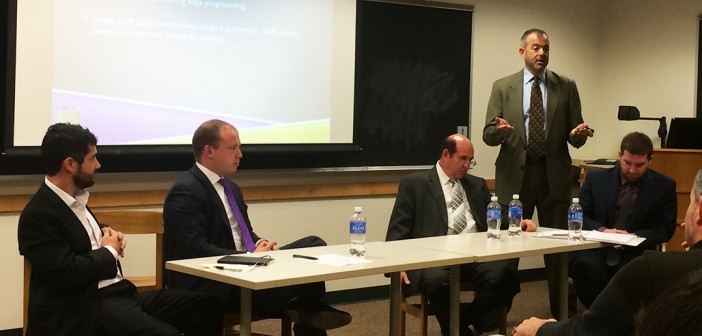Last week, three different historically Jewish fraternities — Zeta Beta Tau, Sigma Alpha Mu and Alpha Epsilon Pi — gave presentations to convince Lehigh to choose their chapter to join Lehigh’s Greek community. A proposal had been submitted to the Lehigh Unviersity Interfraternity Council two years ago requesting that such a fraternity join the community.
Jennifer Tedeschi, an Interfraternity Council adviser, said it took two years from when Lehigh received the proposal to actually begin looking for a Jewish fraternity because other issues affecting Greek life, such as the FMA bankruptcy and Umoja House vandalism, forced the committee to push back its timeline.
She said that as of now, whichever fraternity Lehigh chooses will be non-residential, as there are currently no open houses on “The Hill.”
Although AEPi is currently active on Lehigh’s campus, it is not formally recognized as a fraternity, which is why Lehigh is considering an outside organization, such as ZBT or “Sammy.”
“AEPi has been an unrecognized group for some time now, and that plays a factor in the committee’s decision,” Tedeschi said. “We wanted to give all three organizations founded on Jewish ideals a chance.”
According to the ZBT website, the organization was founded in 1898 as the nation’s first Jewish fraternity. The fraternity accepts men of good character who uphold the values of the fraternity, regardless of religion. The Sammy website says its fraternity’s mission is to encourage academic success and leadership skills among its members as well as offer service opportunities. Members of Sammy are of all faiths, but appreciate that historically it is a fraternity of Jewish men.
Jonathan Cohen, ’15, president of AEPi, said the fraternity was a colony on Lehigh’s campus from 1974 to 1979 and was recognized as an official chapter from 1979 to 1992. However, the chapter was forced to close in 1992 because it did not have enough members. Then, in 2001, a group of students who saw a need for a Jewish fraternity reached out to AEPi international headquarters to bring the fraternity back to Lehigh’s campus.
“The university does not currently recognize AEPi, as the national organization did not follow a university expansion process in 2001,” said Tim Wilkinson, senior assistant dean of students and director of Fraternity and Sorority Affairs. “Lehigh has always recognized AEPi’s right to exist as a private organization, as long as the chapter does not use university resources, or Lehigh’s name, in association with AEPi.”
However, some students on campus recognize AEPi’s involvement on campus in recent years and advocate for Lehigh to choose them over ZBT and Sammy.
“I think there’s no practical reason for Lehigh to be interviewing other Jewish fraternities,” said Jackie Grant, ’15, president of Chabad at Lehigh. “AEPi has worked hard to create an off-campus brotherhood in the hopes of gaining recognition from the school.
“The brothers of AEPi are all very active in the Jewish community at Lehigh, and therefore they make up the ideal constituency of a Jewish fraternity,” Grant continued.
Grant also said she believes interviewing other Jewish fraternities is unfair because it undermines all of the work AEPi has done.
“Overall, I’m really excited about this whole thing,” Cohen said. “I think Lehigh would benefit greatly no matter who it is they choose.”
Although not officially recognized by Lehigh, AEPi is involved with many Jewish organizations on campus. The fraternity currently has about 30 members, some of which have been on the board of Chabad, Hillel, TAMID (the Israel investment group on campus), Friends of Israel and others.
“We’ve been really instrumental in shaping Jewish life on campus, especially in the recent years,” Cohen said. “And so that’s why we were really excited about this thing.”
AEPi at Lehigh prides itself on being one of the only fraternities to pledge money before it is actually raised. Four years ago, AEPi pledged to donate $100,000 to seven different organizations in seven years. The organization achieved its goal in four years.
Recently, it pledged to raise $100,000 for 10 different organizations. Members said they hope that the Expansion Committee considers their campus involvement and philanthropy initiatives when deciding which Jewish fraternity to bring to Lehigh’s campus.
Tedeschi said the Expansion Committee consists of undergraduate students, faculty, staff and alumni. It will base its decision off of whether or not the fraternity fulfills the initial proposal, how it presents itself as a non-residential fraternity and how it incorporates bLUeprint into its accreditation report.
bLUeprint encompasses Lehigh’s five foundations for student success that are sought in accreditation reports. The five foundations are creative curiosity, identity development, collaborative connections, inclusive leadership and professional growth and success.
Wilkinson said he is not worried that the addition of a historically Jewish fraternity on campus will garner any backlash from other religious groups on campus.
“It is important to understand that Jewish fraternities are about cultural support and advocacy,” Wilkinson said. “There are no requirements that one must be of Jewish faith. The values of Sigma Alpha Mu, Alpha Epsilon Pi, and Zeta Beta Tau revolve around the Jewish culture, and their philanthropic, community service and education programming often are in support of this.
“Whenever Lehigh is approached with a request for expansion that fills a need for our students, we respect that, and try to fulfill that need.”
National ZBT staff members and national Sammy staff members and alumni will be putting on the presentations. The presentations are open to the public so that members of the Lehigh community can come and see what these different organizations have to offer.
“I think the most important thing is that we’re giving an equal chance to all organizations and that includes AEPi,” Tedeschi said. “While that has different circumstances than the two, we’re still giving equal weight to all three.”
Cohen said AEPi’s overall objective is to further Jewish student life at Lehigh.
“We’re thrilled that Lehigh has committed itself to strengthening the Greek community by welcoming a fraternity fundamentally committed to Jewish ideals, whichever fraternity that may ultimately be,” Cohen said.






Comment policy
Comments posted to The Brown and White website are reviewed by a moderator before being approved. Incendiary speech or harassing language, including comments targeted at individuals, may be deemed unacceptable and not published. Spam and other soliciting will also be declined.
The Brown and White also reserves the right to not publish entirely anonymous comments.
2 Comments
It seems to me that Lehigh’s social policies are so oppressive that it is beyond me why AEPi would want to come under the diktats of Smeaton’s totalitarian purview as promulgated and enforced by the OFSA.
From what I gather, AEPi has been doing just fine for years.
Smeaton has an uber liberal world view and has viscously attacked those who disagree with his agenda. This encompasses not only the fraternities and sororities. He hounded the conservative Lehigh Patriot student newspaper out of existence a few years ago by harassing their reporters and editors unmercifully.
Pingback: A History of Greek Life at Lehigh University | Tim O'Hearn